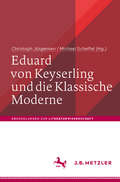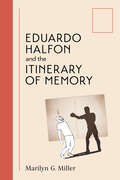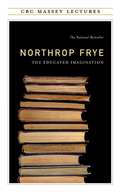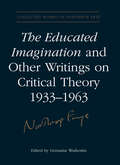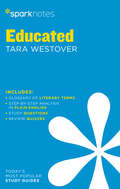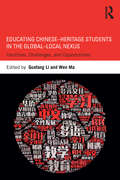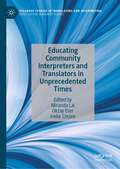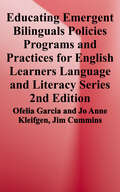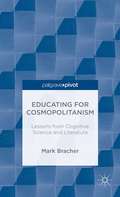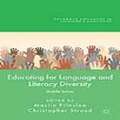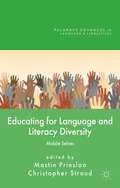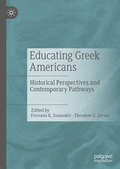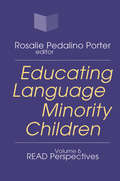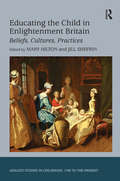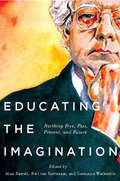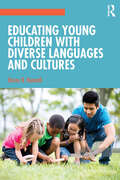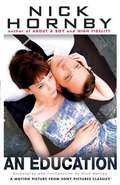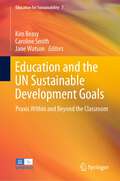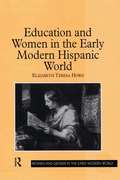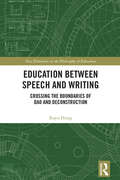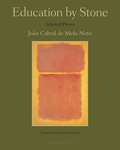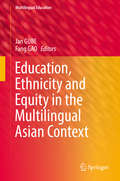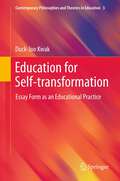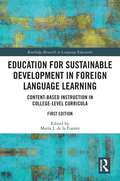- Table View
- List View
Eduard von Keyserling und die Klassische Moderne (Abhandlungen zur Literaturwissenschaft)
by Christoph Jürgensen Michael ScheffelEduard von Keyserlings Werk geriet, trotz prominenter Fürsprecher wie Hermann Hesse, Herman Bang oder Thomas Mann, so häufig in Vergessenheit, wie es wiederentdeckt wurde. Zumeist erscheint Keyserling als ästhetischer Spätling, der nostalgisch von untergehenden baltischen Welten erzählt. Der zum 100. Todestag konzipierte Band zeichnet hingegen Keyserlings skeptische Moderne und mithin seinen Beitrag zur ‚Klassische Moderne‘ nach. Die Studien zu den Romanen, Dramen und Essays situieren den Autor in den Diskursen und der literarischen Szene der Zeit und untersuchen u.a. Erzählstrategien und Gender-Diskurse sowie die Werkpoetik Keyserlings. Der Befund zeigt, dass sich bei Keyserling (thematisch) sentimentale Rückblicke auf die Zeit vor der Moderne verbinden mit (formal) Stilmitteln der Moderne und schließlich (diskursiv) einer Reflexion über die Moderne. Entsprechend begleitet er ‚seine‘ Epoche von ihren Anfängen bis in ihr Auslaufen.
Eduardo Halfon and the Itinerary of Memory
by Marilyn G. MillerArguably, all of Guatemalan writer Eduardo Halfon&’s fictional works deal with quandaries of translation, even in their original versions. The award-winning author of fifteen books claims to have lost his mother tongue when his family fled to the United States after his tenth birthday. This displacement, echoing the displacement of his four grandparents from different corners of the Jewish diaspora to Guatemala, gives Halfon, like his ancestors before him, good reason to consider translation a natural environment for his creative work and for life itself. Indeed, Halfon&’s uncanny ability to translate his family&’s history into &“fictions&” that resonate across the globe with readers in Spanish, English, and several other languages helps explain why he has received numerous prizes in the United States, Spain, Guatemala, and even France, some as a Latin American author, others as a Latino or Jewish author. Marilyn G. Miller has written the first study to focus exclusively on this important voice in Jewish–Latin American letters. Only after returning to Guatemala and regaining his command of Spanish through reading literature did Halfon begin to build his life as a writer and translator. Nonetheless, the author admits that &“one thing is stubbornly true, and it&’s this: every sentence that I write, every verb or adjective that I painstakingly insert or remove, every literary thought that I have while writing, always . . . begins and ends in English.&” Halfon&’s translated works are never parallel texts, however. Thus, translation and its side effects (foreign words, linguistic lacunae, multilingual modes of perception) offer us crucial keys to understanding the author&’s fictional world as a vehicle for retelling and surviving Jewish trauma and finding his own particular plurilingual voice.
The Educated Imagination (The CBC Massey Lectures)
by Northrop Frye"What good is the study of literature? Does it help us think more clearly, or feel more sensitively, or live a better life than we could without it?" Written in the relaxed and frequently humorous style of his public lectures, this remains, of Northrop Frye's many books, perhaps the easiest introduction to his theories of literature and literary education.
The Educated Imagination and Other Writings on Critical Theory 1933-1963
by Northrop Frye Germaine WarkentinIn 1933, Northrop Frye was a recent university graduate, beginning to learn his craft as a literary essayist. By 1963, with the publication of The Educated Imagination, he had become an international academic celebrity. In the intervening three decades, Frye wrote widely and prodigiously, but it is in the papers and lectures collected in this installment of the Collected Works of Northrop Frye, that the genesis of a distinguished literary critic can be seen. Here is Frye tracing the first outlines of a literary cosmology that would culminate in The Anatomy of Criticism (1958) and shapeThe Great Code (1982) and Words with Power (1990). At the same time that Frye garnered such international acclaim, he was also a working university teacher, lecturing in the University of Toronto's English Language and Literature program. In her lively introduction, Germaine Warkentin links Frye's evolution as a critic with his love of music, his passionate concern for his students, and his growing professional ambition. The writings included in this volume show how Frye integrated ideas into the work that would consolidate the fame that Fearful Symmetry (1947) had first established.
Educated SparkNotes Literature Guide (SparkNotes Literature Guide Series)
by SparkNotesSimplify studying with this portable literature guide, filled with resources to help you thrive in English class! Educated, a memoir written by Tara Westover, follows the author&’s break from her survivalist family to pursue education and knowledge. This literature guide includes a complete plot summary and analysis; key themes, motifs, and symbols; explanation of important quotes; suggested essay topics; and a review quiz. Complete Plot Summary and AnalysisKey Facts About the WorkAnalysis of Major CharactersThemes, Motifs, and SymbolsExplanation of Important QuotationsAuthor&’s Historical ContextSuggested Essay Topics25-Question Review Quiz
Educating Chinese–Heritage Students in the Global–Local Nexus: Identities, Challenges, and Opportunities
by Guofang Li Wen MaWeaving together a richly diverse range of student voices, perspectives, and insights, this collection of studies from around the world offers the educational community a better understanding of K-12 and adult Chinese–heritage students’ languages, cultures, identities, motivations, achievements, and challenges in various cross-cultural settings outside North America. Specifically, it addresses these overarching questions: What are Chinese–heritage students’ experiences in language and education in and outside schools? How do they make sense of their multiple ethnic and sociocultural identities? What unique educational challenges and difficulties do they encounter as they acculturate, socialize, and integrate in their host country? What are their common struggles and coping strategies? What are the instructional practices that work for these learners in their specific contexts? What educational implications can be drawn to inform their teachers, fellow students, parents, and their educational communities in a global context? Individual chapters employ different theoretical frameworks and methodological instruments to wrestle with these questions and critical issues faced by Chinese–heritage learners.
Educating Community Interpreters and Translators in Unprecedented Times (Palgrave Studies in Translating and Interpreting)
by Miranda Lai Oktay Eser Ineke CrezeeThis edited book features contributions from interpreter and translator educators globally, in which they discuss changes to teaching, assessment and practice as a result of the COVID-19 pandemic. The chapters provide a comprehensive picture of educators’ responses to challenges and opportunities. The book will be of interest to students, researchers and educators, as well as government language policymakers and stakeholders of translation and interpreting agencies.
Educating Emergent Bilinguals: Policies, Programs, and Practices for English Learners (Language and Literacy Series)
by Jo Anne Kleifgen Ofelia GarcíaThis accessible guide in a revised and expanded edition introduces readers to the issues and controversies surrounding the education of language minority students in the United States. What makes this book a perennial favorite are the succinct descriptions of alternative practices for transforming our schools and students' futures, such as building on students' home languages and literacy practices, incorporating curricular and pedagogical innovations, using proven-effective approaches to parent engagement, and employing alternative assessment tools. <p><p>The authors have updated their bestseller to reflect recent shifts in policies, programs, and practices due to globalization and the changing economy; demographic trends; and new research on EL pedagogy. A totally new chapter highlights multimedia and multimodal instructional possibilities for engaging EL students. <p><p>This Second Edition is essential reading for all teachers of language-minority students, as well as principals, superintendents, and policymakers. <p><p>Book Features: <p>- Uses the most up-to-date research findings to demonstrate how ignoring children's bilingualism perpetuates inequities in their schooling. <p>- Points out the problems with current policies and practices and proposes more effective alternative methods. <p>- Contrasts the common view of bilingualism as either subtractive or additive with more current understandings of individual bilingualism in translanguaging theories. <p>- Highlights how multimodalities form part of students' communicative repertoire and shows teachers how they can leverage this to engage students.
Educating for Cosmopolitanism: Lessons from Cognitive Science and Literature
by Mark BracherDrawing on developments in cognitive science, Bracher formulates pedagogical strategies for teaching literature in ways that develop students' cognitive capabilities for cosmopolitanism, the pursuit of global equality and justice. Several staple classroom texts, such as Things Fall Apart, provide detailed examples for teaching practices.
Educating for Language and Literacy Diversity
by Mastin Prinsloo Christopher StroudEducators and researchers in variety of locations increasingly encounter linguistically and socio-culturally diverse groups of students in their classrooms and lecture halls. This book examines everyday forms of talk and writing in relation to standardised forms and schooling expectations to suggest ways forward in educational discourse.
Educating for Language and Literacy Diversity: Mobile Selves (Palgrave Advances In Language And Linguistics Ser.)
by Mastin Prinsloo Christopher StroudEducators and researchers in variety of locations increasingly encounter linguistically and socio-culturally diverse groups of students in their classrooms and lecture halls. This book examines everyday forms of talk and writing in relation to standardised forms and schooling expectations to suggest ways forward in educational discourse.
Educating Greek Americans: Historical Perspectives and Contemporary Pathways
by Fevronia K. Soumakis Theodore G. ZervasThis edited collection considers Greek American formal and informal educational efforts, institutions, and programs, broadly conceived, as they evolved over time throughout the United States. The book’s focus on Greek Americans aims to highlight the vast array of educational responses to local needs and contexts as this distinct, yet, heterogeneous immigrant community sought to maintain its linguistic, cultural, and religious heritage for over one hundred years. The chapters in this volume amend the scholarly literature that thus far has not only overlooked Greek American educational initiatives, but has also neglected to recognize and analyze the community’s persistence in sustaining them. This book is an important contribution to an understanding of Greek Americans’ long overdue history as a significant diaspora community within an American context.
Educating Language Minority Children
by Rosalie PorterREAD Perspectives, a refereed annual publication of the Institute for Research in English Acquisition and Development (READ), Washington, D.C., begins its sixth year with the theme "Educating Language Minority Children: An Agenda for the Future." Volume 6 features presentations from a Boston University conference organized by READ and the Pioneer Institute. The essays represent truly diverse viewpoints on the education of limited-English students, rare in the complex and contentious arena of bilingual education.The lead article, "Rethinking Bilingual Education," by Charles L Glenn of Boston University, inspired the conference's organization. Dr. Glenn proposes new ways of schooling limited-English-speaking children that depart dramatically from the practices of the past 30 years. He proposes sound recommendations for revising Massachusetts bilingual education law, ideas that could well be applied in other states. Also included areChristine Rossell's "Mystery on the Bilingual Express," a critique of the controversial study by Thomas and Collier; Rosalie Pedalino Porter's follow-up review of El Paso, Texas's programs for English learners; Mark Lopez's "Labor Market Effects of Bilingual Education"; "Bethlehem, Pennsylvania's English Acquisition Program," by Thomas J. Dolusio; Maria Estela Brisk's discussion on the need to restructure schools to incorporate the large non-English student population; several articles regarding educational reform in Massachusetts, including two by school superintendents Eugene Creedon and Douglas Sears, and one by Harold Lane, Chairman of the Joint Education Committee in the Massachusetts Legislature; and, finally, Kevin Clark's "From Primary Language Instruction to English Immersion: How Five California Districts Made the Switch." Kevin Clark's California study "From Primary Language Instruction to English Immersion: How Five California Districts Made the Switch," describes how radical changes are being carried out in a few representative school districts since passage of California Proposition 227, the "English for the Children" initiative. Educating Language Minority Children is a valuable selection of the most current thinking on policies, programs, and practices affecting limited-English students in U.S. public schools. It provides a wealth of practical information useful to educators, parents, legislators, and policy analysts, and is an essential addition to libraries nationwide.
Educating the Child in Enlightenment Britain: Beliefs, Cultures, Practices (Studies in Childhood, 1700 to the Present)
by Mary Hilton Jill ShefrinPosing a challenge to more traditional approaches to the history of education, this interdisciplinary collection examines the complex web of beliefs and methods by which culture was transmitted to young people in the long eighteenth century. Expanding the definition of education exposes the shaky ground on which some historical assumptions rest. For example, studying conventional pedagogical texts and practices used for girls' home education alongside evidence gleaned from women's diaries and letters suggests domestic settings were the loci for far more rigorous intellectual training than has previously been acknowledged. Contributors cast a wide net, engaging with debates between private and public education, the educational agenda of Hannah More, women schoolteachers, the role of diplomats in educating boys embarked on the Grand Tour, English Jesuit education, eighteenth-century print culture and education in Ireland, the role of the print trades in the use of teaching aids in early nineteenth-century infant school classrooms, and the rhetoric and reality of children's book use. Taken together, the essays are an inspiring foray into the rich variety of educational activities in Britain, the multitude of cultural and social contexts in which young people were educated, and the extent of the differences between principle and practice throughout the period.
Educating the Imagination: Northrop Frye, Past, Present, and Future
by Alan Bewell Neil ten Kortenaar Germaine WarkentinNorthrop Frye's long career made him Canada's most creative public intellectual. A century after his birth, his many books demonstrate a powerful vision of the resources of the human imagination. Frye's critical theory sought the continuities linking human creation in all spheres of life, trusting in the idea of a single human community sharing myths, stories, and images that express shared visions and desires. The essays in Educating the Imagination illustrate the extraordinary range of Frye's ideas. Robert Bringhurst examines how Frye mapped the mind, Ian Balfour considers what "belief" meant for Frye, and Gordon Teskey re-examines two of the critic's great subjects - Blake and Milton. Michael Dolzani and Thomas Willard discuss Frye's symbolism, and Robert Tally looks at his utopianism. A strong thread running through all the essays is Frye's interest in the Romantic era, as Mark Ittenson shows. Three essays pair Frye with other titans of the time: Fredric Jameson, Paul de Man, and Jacques Derrida. Troni Y. Grande examines a gender issue in Frye's theory of tragedy, and J. Edward Chamberlin concludes by relating Frye's writings to songs, ceremonies of belief, and the common ground that they represent across cultures. Engaging with significant matters of contemporary concern, Educating the Imagination provides a renewed understanding of Northrop Frye and the fertility of his ideas about the imagination and society. Contributors include Ian Balfour (York), Robert Bringhurst, Adam Carter (Lethbridge), J. Edward Chamberlin (Toronto), Alexander Dick (British Columbia), Michael Dolzani (Baldwin Wallace), Troni Y. Grande (Regina), Mark Ittensohn (Zurich), Garry Sherbert (Regina), Robert T. Tally, Jr., (Texas State), Gordon Teskey (Harvard), and Thomas Willard (Arizona).
Educating the Imagination - Northrop Frye Past, Present, and Future
by Germaine Warkentin Neil Ten Kortenaar Alan BewellNorthrop Frye's long career made him Canada's most creative public intellectual. A century after his birth, his many books demonstrate a powerful vision of the resources of the human imagination. Frye's critical theory sought the continuities linking human creation in all spheres of life, trusting in the idea of a single human community sharing myths, stories, and images that express shared visions and desires. The essays in Educating the Imagination illustrate the extraordinary range of Frye's ideas. Robert Bringhurst examines how Frye mapped the mind, Ian Balfour considers what "belief" meant for Frye, and Gordon Teskey re-examines two of the critic's great subjects - Blake and Milton. Michael Dolzani and Thomas Willard discuss Frye's symbolism, and Robert Tally looks at his utopianism. A strong thread running through all the essays is Frye's interest in the Romantic era, as Mark Ittenson shows. Three essays pair Frye with other titans of the time: Fredric Jameson, Paul de Man, and Jacques Derrida. Troni Y. Grande examines a gender issue in Frye's theory of tragedy, and J. Edward Chamberlin concludes by relating Frye's writings to songs, ceremonies of belief, and the common ground that they represent across cultures. Engaging with significant matters of contemporary concern, Educating the Imagination provides a renewed understanding of Northrop Frye and the fertility of his ideas about the imagination and society. Contributors include Ian Balfour (York), Robert Bringhurst, Adam Carter (Lethbridge), J. Edward Chamberlin (Toronto), Alexander Dick (British Columbia), Michael Dolzani (Baldwin Wallace), Troni Y. Grande (Regina), Mark Ittensohn (Zurich), Garry Sherbert (Regina), Robert T. Tally, Jr. , (Texas State), Gordon Teskey (Harvard), and Thomas Willard (Arizona).
Educating Young Children with Diverse Languages and Cultures
by Karen N. NemethThis comprehensive textbook prepares early childhood educators to effectively work with and support young children (ages 0-8) with diverse languages, cultures, and learning needs. With a multipurpose, multilevel format, this dynamic resource focuses on the central role of language development and culture in all aspects of learning. Adaptable chapters cover curriculum, family involvement, co-teaching, classroom environment and more, and feature both brief and deeper study versions of the material, alongside a wealth of case examples and implementation strategies. Accompanied by an online instructor’s manual, this ground-breaking text is an ideal resource for students and educators in early childhood and second language education, and all fields that work with young children, and all fields that work with young children.
An Education
by Nick HornbyFrom the New York Times bestselling author—the shooting script to his award-winning film, with an original Introduction and vivid stills from the movie. Jenny is a 16-year-old girl stifled by the tedium of adolescence; she can’t wait for her sophisticated adult life to begin. One rainy day her suburban existence is upended by the arrival of David, a much older suitor who introduces her to a glittering new world of concerts, art, smoky bars, urban nightlife, and his glamorous friends, replacing her traditional education with his own version. It could be her awakening—or her undoing. This edition of Hornby’s adapted screenplay, which includes stills from the film, is a perfect accompaniment to the highly anticipated movie, which stars Carey Mulligan as Jenny, Peter Sarsgaard, Emma Thompson, Dominic Cooper, and Alfred Molina. It is a must-have for fans of Hornby’s novels, featuring his signature pitch-perfect dialogue, mordant wit, and the resonant humanity of his writing. Watch a Video .
Education and the UN Sustainable Development Goals: Praxis Within and Beyond the Classroom (Education for Sustainability #7)
by Kim Beasy Caroline Smith Jane WatsonThis book focuses on the complex relationship between education and the Sustainable Development Goals (SDGs) and highlights how important context is for both critiquing and achieving the Goals though education, given the critical role teachers, schools and curriculum play in young people’s lives. Readers will find examples of thinking and practice across the spectrum of education and training sectors, both formal and informal. The book adds to the increasing body of literature that recognises that education is, and must be, in its praxis, at the heart of all the SDGs. As we enter the third decade of the 21st century, we have a clear understanding of the wicked and complex crises regarding the health of life on our planet, and we cannot ignore the high levels of anxiety our young people are experiencing about their future. Continuing in the direction of unsustainable exploitation of people and nature is no longer an option if life is to have a flourishing future. The book illustrates how SDGs are supported in and by education and training, showcasing the conditions necessary to ensure SDGs are fore fronted in policy reform. It includes real-world examples of SDGs in education and training contexts, as well as novel critiques of the SDGs in regard to their privileging of anthropocentrism and neoliberalism. This book is beneficial to academics, researchers, post graduate and tertiary students from all fields relating to education and training. It is also of interest to policy developers from across disciplines and government agencies who are interested in how the SDGs relate to education.
Education and Women in the Early Modern Hispanic World (Women and Gender in the Early Modern World)
by Elizabeth Teresa HoweConsidering the presence and influence of educated women of letters in Spain and New Spain, this study looks at the life and work of early modern women who advocated by word or example for the education of women. The subjects of the book include not only such familiar figures as Sor Juana and Santa Teresa de Jesús, but also of less well known women of their time. The author uses primary documents, published works, artwork, and critical sources drawn from history, literature, theatre, philosophy, women's studies, education and science. Her analysis juxtaposes theories espoused by men and women of the period concerning the aptitude and appropriateness of educating women with the actual practices to be found in convents, schools, court, theaters and homes. What emerges is a fuller picture of women's learning in the early modern period.
Education between Speech and Writing: Crossing the Boundaries of Dao and Deconstruction (New Directions in the Philosophy of Education)
by Ruyu HungThis unique book explores how graphocentrism affects Chinese education and culture. It moves away from the contemporary educational practices in China of following the Western model of phonocentrism, to demonstrate that each perspective interacts and counteracts with each other, creating a dialogue between Eastern and Western thought. Chapters explore the consonances and dissonances between the two, problematizing the educational practices of Chinese tradition and proposing a dialectical thinking of post-graphocentrism, based on the concepts of Dao and deconstruction. The volume creates a unique area in the field of philosophy of education by questioning the writing/speaking relationship in Chinese tradition, complete with educational ideas and practices that consider the uniqueness of Chinese character writing. A pioneering study of its kind, Education between Speech and Writing provides a valuable source for students of philosophy of education, as well as students and academics in the field of Chinese Studies. The book will also appeal to anyone interested in dialogues between Chinese and Western thoughts, especially negotiating between Daoism and deconstruction.
Education by Stone
by Joao Cabral de Melo Neto Richard ZenithImagine making poems the way an architect designs buildings or an engineer builds bridges. Such was the ambition of João Cabral de Melo Neto. Though a great admirer of the thing-rich poetries of Francis Ponge and of Marianne Moore, what interested him even more, as he remarked in his acceptance speech for the 1992 Neustadt International Prize for Literature, was "the exploration of the materiality of words," the "rigorous construction of (. . .) lucid objects of language." His poetry, hard as stone and light as air, is like no other.
Education, Ethnicity and Equity in the Multilingual Asian Context (Multilingual Education #32)
by Jan Gube Fang GaoThe book addresses issues related to the education of ethnic minority individuals in the multilingual Asian region. It features recent research and practices of scholars aiming to rethink educational policy and practice surrounding the education of ethnic minority students with a variety of language scenarios in Hong Kong and other Asian contexts. It documents how ethnicity and inequality are played out at policy, school, and individual levels, and how these affect the education of ethnic minorities in their host societies. Using a range of methods, from surveys to interviews and document analysis, this book describes the links between language, identity and educational inequality related to ethnic minorities in Asian contexts.
Education for Self-transformation
by Duck-Joo KwakExemplifying what it advocates, this book is an innovative attempt to retrieve the essay form from its degenerate condition in academic writing. Its purpose is to create pedagogical space in which the inner struggle of 'lived experience' can articulate itself in the first person. Working through essays, the modern, 'post-secular' self can guide, understand, and express its own transformation. This is not merely a book about writing methods: it has a sharp existential edge. Beginning by defining key terms such as 'self-transformation', Kwak sketches the contemporary debates between Jürgen Habermas and Charles Taylor on the status of religious language in the public domain, and its relationship to secular language. This allows her to contextualize her book's central questions: how can philosophical practice reduce the experiential rift between knowledge and wisdom? How can the essay form be developed so that it facilitates, as praxis, pedagogical self-transformation? Kwak develops her answers by working through ideas of George Lukács and Stanley Cavell, of Hans Blumenberg and Søren Kierkegaard, whose work is much less familiar in this context than it deserves to be. Kwak's work provides templates for new forms of educational writing, new approaches to teaching educators, and new ways of writing methodology for educational researchers. Yet the importance of her ideas extends far beyond teaching academies to classroom teachers, curriculum developers - and to anyone engaged in the quest to lead a reflective life of one's own.
Education for Sustainable Development in Foreign Language Learning: Content-Based Instruction in College-Level Curricula (Routledge Research in Language Education)
by María J. de la FuenteThis unique volume utilizes the UNESCO Education for Sustainable Development (ESD) framework to illustrate successful integration of sustainability education in post-secondary foreign language (FL) learning. Showcasing a variety of approaches to using content-based instruction (CBI) in college-level courses, this text valuably demonstrates how topics relating to environmental, social, and cultural dimensions of sustainability can be integrated in FL curricula. Chapters draw on case studies from colleges throughout the US and consider theoretical and practical concerns relating to models of sustainability-based teaching and learning. Chapters present examples of project-, problem-, and task-based approaches, as well as field work, debate, and reflective pedagogies to enhance students’ awareness and engagement with sustainable development issues as they acquire a foreign language. Insights and recommendations apply across languages and highlight the potential contribution of FL learning to promote sustainability literacy amongst learners. This text will benefit researchers, academics, and educators in higher education with an interest in Modern Foreign Languages, sustainability education, training, and leadership more broadly.
